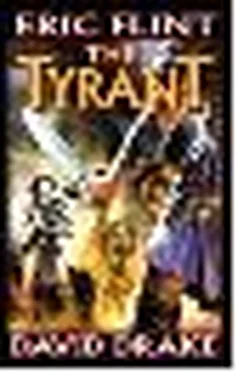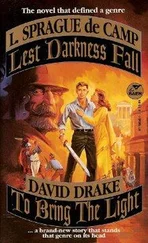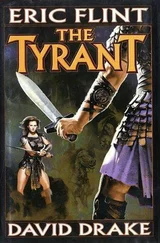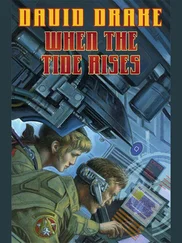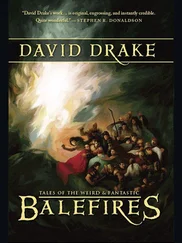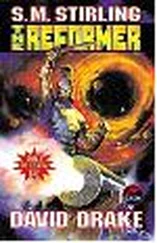David Drake - Tyrant
Здесь есть возможность читать онлайн «David Drake - Tyrant» весь текст электронной книги совершенно бесплатно (целиком полную версию без сокращений). В некоторых случаях можно слушать аудио, скачать через торрент в формате fb2 и присутствует краткое содержание. Жанр: Боевая фантастика, на английском языке. Описание произведения, (предисловие) а так же отзывы посетителей доступны на портале библиотеки ЛибКат.
- Название:Tyrant
- Автор:
- Жанр:
- Год:неизвестен
- ISBN:нет данных
- Рейтинг книги:5 / 5. Голосов: 1
-
Избранное:Добавить в избранное
- Отзывы:
-
Ваша оценка:
- 100
- 1
- 2
- 3
- 4
- 5
Tyrant: краткое содержание, описание и аннотация
Предлагаем к чтению аннотацию, описание, краткое содержание или предисловие (зависит от того, что написал сам автор книги «Tyrant»). Если вы не нашли необходимую информацию о книге — напишите в комментариях, мы постараемся отыскать её.
Tyrant — читать онлайн бесплатно полную книгу (весь текст) целиком
Ниже представлен текст книги, разбитый по страницам. Система сохранения места последней прочитанной страницы, позволяет с удобством читать онлайн бесплатно книгу «Tyrant», без необходимости каждый раз заново искать на чём Вы остановились. Поставьте закладку, и сможете в любой момент перейти на страницу, на которой закончили чтение.
Интервал:
Закладка:
"Are you positive?" asked the young man, now grinning. "If there's any doubt at all, best you barf it up now. My sister's waiting for you inside, and — you know this much, I'm sure — the gods help you if you puke all over her. "
Chapter 15
Marange was the most bizarre city Helga had ever seen. It reminded her of a madhouse more than anything else. There seemed to be no rhyme or reason to the way anything was designed or constructed, outside of the immediate harbor area itself.
Docks and piers, in the nature of things, look much the same the world over. She would have said the same about buildings in general, before she encountered Marange. Granted, architectural styles varied from one nation to the next. Still, all towns and cities of her acquaintance, even the exotic islander city of Vase, had a logic to them.
Not so Marange. Although the city was technically a Southron one — the only real "city" anywhere in the southern half of the continent — its population was not more than a third Southron by birth. At least, its more-or-less permanent population. And even the Southrons dwelling there were, for the most part, outlaws and outcastes from their own barbarian society.
The inhabitants of Marange were the flotsam and jetsam of the whole world. They came from everywhere; every part of the continent, and every island. The only thing they really had in common was that, for whatever reason, they had been discarded by their own folk — or, as often as not, forced to flee for their lives.
Marange only existed at all for two reasons. The first was that, located at the highest point of the Blood River which was navigable by seagoing ships — almost 150 miles upstream from the ocean itself — it made a good and safe harbor. Whatever trade did take place between the southern barbarians and the rest of the world was channeled through Marange.
Secondly, it provided the Southrons with a gathering place for their annual intertribal assembly. That annual assembly, which took place in the autumn, was a great event for barbarian society. Its official purpose was to elect the Chief of Chiefs and settle whatever intertribal quarrels could be settled short of warfare. But it also provided them with a combination fair, trading mart, wife-seeking market, athletic contests, jousts, carnivals — and, of course, the most important time in the year for buying exotic goods brought from the civilized lands to the north.
Marange nestled against the eastern bank of the Blood River. Beyond the city's limits — insofar as it could be said to have any definite "limits" — stretched a rolling plain which provided a suitable meeting ground for the assembled barbarian tribes. During the assembly, that plain was well-nigh covered with the tents and huts erected by the tribesmen. Those temporary dwellings ranged in size and splendor from holes dug in the ground and covered with branches to the gigantic pavilions erected by the tribal chiefs.
The city itself had a similar cacophony. There was no real government ruling the place. Technically, Marange was neutral territory not allied to any tribe, and thus came under the official and direct jurisdiction of the Chief of Chiefs. But, in the real world, a Chief of Chiefs was a largely ceremonial post. The Chief of Chiefs had no residence separate from his own tribe. And, once the assembly was over, the Chief of Chiefs would depart the area and spend the rest of the year living in whatever portion of the southern continent his tribe happened to lay claim over.
As a result, the Chief of Chiefs paid no attention to Marange. For all practical purposes, the only order and authority which existed in the city was whatever its own inhabitants provided. And since they, in turn, were hardly any less tribal in their own way than the Southrons, no one had ever really tried to exercise authority over the city as a whole. Each group of outcasts tended to congregate in its own quarter. What "order" existed was whatever they saw fit to provide — and then, only for their own.
Needless to say, this posed a perilous situation for an uninformed visitor. "Dangerous as Marange" was a saying which could be found in all the major languages of the north and the Islands.
For most visitors, however, the danger was not too great. That was for the simple reason that most visitors were northern and Islander merchants, and each of those groups had their own well-established quarters in the city. The northerners — mostly Emeralds — directly north of the harbor area; the Islanders — mostly from Vase — directly east. A merchant doing business in Marange quickly learned to establish a firm relationship with the resident "traders' associations," which would provide him both with secure lodgings and an armed escort whenever he found it necessary to take his goods inland to the fairs themselves.
Anyone else took their chances. Emeralds might try to find a refuge in the "Emerald Quarter," located in the city's southern portion. But even for an Emerald, that was chancy. The Emeralds who lived there were either half-breeds or criminals or, usually, both — and despite the vigor with which they defended their "Emerald" status, seemed no less inclined to rob and murder an Emerald than anyone else.
Outcasts from the Islands had a similar quarter, located more or less in what could be called, more or less, Marange's "downtown."
There were also, scattered here and there and intermingled with various tribal groups, portions of the city inhabited by people from the Vanbert Confederacy. These areas were even more dangerous, however. The inhabitants were not so much criminals, in the professional sense of that term which could be applied to the Emerald or Islander exiles, as they were people so destitute and desperate that they had fled the Confederacy for the shaky refuge of Marange. Runaway slaves, for the most part.
Finally — so Sharlz Thicelt discovered with a little investigation as soon as they arrived and moored at one of the piers — there was a new sector in the city. Located next to the familiar "Emerald Quarter," it was being called the "New Emerald Quarter." The distinction was apparently not a subtle one. It seemed that shortly after their arrival, one of the "new Emeralds" was robbed and murdered by a gang of Emerald criminals — and the rest of the "new Emeralds" had immediately responded by massacring every member of that gang, some dozen or so others who happened to have the misfortune to be in the area, and had then for good measure burned down a goodly chunk of the old Emerald Quarter in order to create a no-man's-land between it and the new complex of residences they were erecting on the southern outskirts of the city. Which, Thicelt was told, resembled a Confederate army camp more than anything else.
"That's our boys," announced Jessep with satisfaction, upon being told the news. "Are you ready, girl?"
Helga nodded. Not more than five minutes later, she was being escorted to her destination through the streets of Marange by Jessep's hundred as well as Trae's unit of arquebusiers — all of them scowling at every resident of the city they came upon. They were a most ferocious looking crew, and even the crowded streets and alleys of Marange opened up before them.
Needless to say, neither Helga herself nor any of the other women nestled in the center of this column were molested along the way. The only man who did have the temerity to ogle them found himself lying bloody-faced on the street seconds later.
One of Trae's men did for that. The arquebusiers had discovered early on that a gun-butt, reversed, made an excellent club in close quarters. Trae had to restrain the man from shooting his victim; and only managed to do so by appealing to the need to conserve ammunition. Helga's escort was practically bristling, like a very large dog will when he encounters strange mutts.
Читать дальшеИнтервал:
Закладка:
Похожие книги на «Tyrant»
Представляем Вашему вниманию похожие книги на «Tyrant» списком для выбора. Мы отобрали схожую по названию и смыслу литературу в надежде предоставить читателям больше вариантов отыскать новые, интересные, ещё непрочитанные произведения.
Обсуждение, отзывы о книге «Tyrant» и просто собственные мнения читателей. Оставьте ваши комментарии, напишите, что Вы думаете о произведении, его смысле или главных героях. Укажите что конкретно понравилось, а что нет, и почему Вы так считаете.
